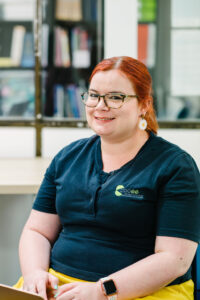What is Neurodiversity?
Our Alderley North Brisbane Clinical Lead Speech Pathologist, Emma Lefever, talks Neurodiversity this Neurodiversity week!
Neurodiversity week is here (13-19 March 2023); but just what is ‘Neurodiversity’ and why is it such a big thing?
Before we get into neurodiversity, we first need to understand what neurodivergent and neurotypical means.
When it comes down to it, being neurodivergent means thinking and perceiving in a different way. It is often used as an umbrella term for a variety of different diagnoses and labels such as Autism Spectrum D (ASD), Attention Deficit Hyperactivity Disorder (ADHD), Dyslexia and Dyspraxia to name some. With that in mind, being ‘neurotypical’ therefore applies to individuals that think and feel in the way perceived to be ‘the norm’ by the general population.

It is important to understand that one is not better than the other. It is not better to be neurotypical or neurodivergent; they are simply different ways that different people view and relate to the world.
This is what neurodiversity is – the idea that people experience and interact with the world around them in many different ways. There is no one “right” way of thinking, learning, and behaving, and these differences are not viewed as deficits.
A neurodiverse group will have both neurodivergent and neurotypical individuals. Neurodiversity honours both neurotypical (our ‘typical thinkers’) and neurodivergent (those who think differently to everyone else) individuals.
So…
Why is neurodiversity such a big thing?
Because it not only includes individuals that are neurotypical but includes, accepts and honours those who are neurodivergent – who think and see the world differently.
So what next?
The main thing to keep in mind is to celebrate, support and welcome all individuals, their ideas, their differences and their strengths.

Some other ways you can consider the individual:
- Allow yourself to be led by the individual in terms of their preferences
- Adjust the environment to suit the individual. – Quite often, the environment we are asking them to conform to is not conducive for individuals who are neurodivergent.
- Consider the individuals’ sensory needs
- Provide a quiet area/break out area in case the individual needs time to regulate by themselves
- Avoid the use of ‘no’ or need to use ‘no’
- Ensure every individual has a means to communicate
- Take note of behaviours – every behaviour is an attempt at communication. Accept and honour the communication attempt and work together to determine the message/meaning and what the unmet need may be.
Neurodiverse affirming practice is an emerging area and an area that we at Cooee are passionate about supporting. If you would like any other information about neurodiversity, please get in contact either via our website – www.cooeespeech.com.au ; our socials @cooeespeech or you can contact us at the clinic on 3265 4495 or via email at [email protected]

Emma Lefever
Speech Pathologist & Clinical Lead
